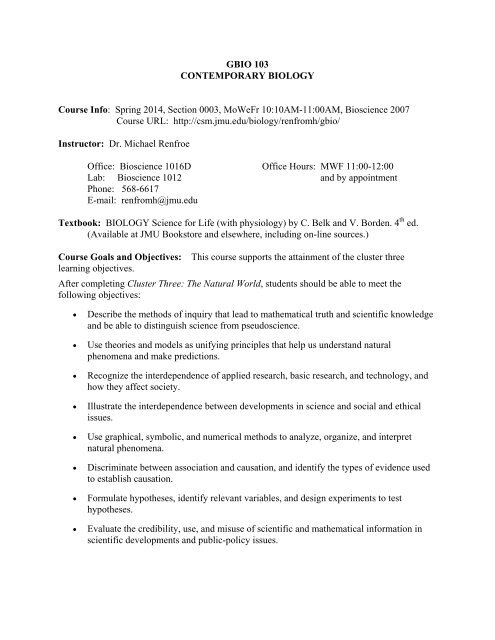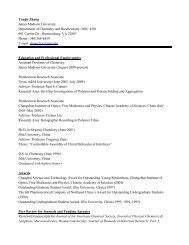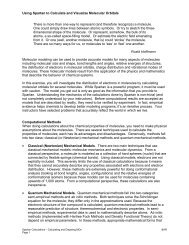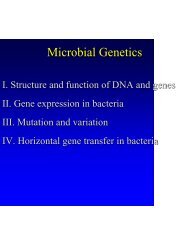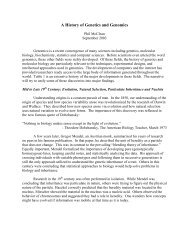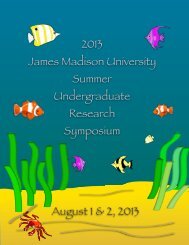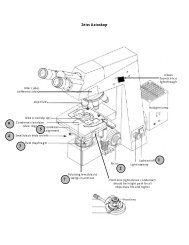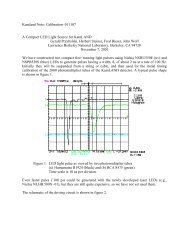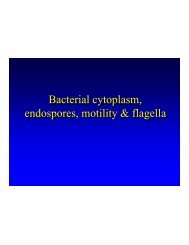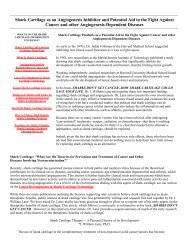GBIO 103 CONTEMPORARY BIOLOGY Course Information: Spring ...
GBIO 103 CONTEMPORARY BIOLOGY Course Information: Spring ...
GBIO 103 CONTEMPORARY BIOLOGY Course Information: Spring ...
You also want an ePaper? Increase the reach of your titles
YUMPU automatically turns print PDFs into web optimized ePapers that Google loves.
<strong>GBIO</strong> <strong>103</strong><br />
<strong>CONTEMPORARY</strong> <strong>BIOLOGY</strong><br />
<strong>Course</strong> Info: <strong>Spring</strong> 2014, Section 0003, MoWeFr 10:10AM-11:00AM, Bioscience 2007<br />
<strong>Course</strong> URL: http://csm.jmu.edu/biology/renfromh/gbio/<br />
Instructor: Dr. Michael Renfroe<br />
Office: Bioscience 1016D Office Hours: MWF 11:00-12:00<br />
Lab: Bioscience 1012 and by appointment<br />
Phone: 568-6617<br />
E-mail: renfromh@jmu.edu<br />
Textbook: <strong>BIOLOGY</strong> Science for Life (with physiology) by C. Belk and V. Borden. 4 th ed.<br />
(Available at JMU Bookstore and elsewhere, including on-line sources.)<br />
<strong>Course</strong> Goals and Objectives: This course supports the attainment of the cluster three<br />
learning objectives.<br />
After completing Cluster Three: The Natural World, students should be able to meet the<br />
following objectives:<br />
<br />
<br />
<br />
<br />
<br />
<br />
<br />
<br />
Describe the methods of inquiry that lead to mathematical truth and scientific knowledge<br />
and be able to distinguish science from pseudoscience.<br />
Use theories and models as unifying principles that help us understand natural<br />
phenomena and make predictions.<br />
Recognize the interdependence of applied research, basic research, and technology, and<br />
how they affect society.<br />
Illustrate the interdependence between developments in science and social and ethical<br />
issues.<br />
Use graphical, symbolic, and numerical methods to analyze, organize, and interpret<br />
natural phenomena.<br />
Discriminate between association and causation, and identify the types of evidence used<br />
to establish causation.<br />
Formulate hypotheses, identify relevant variables, and design experiments to test<br />
hypotheses.<br />
Evaluate the credibility, use, and misuse of scientific and mathematical information in<br />
scientific developments and public-policy issues.
Nature of <strong>Course</strong> Content:<br />
<strong>Course</strong> Description: <strong>GBIO</strong> <strong>103</strong>. Contemporary Biology (3, 0). 3 credits.<br />
An in-depth exploration of selected biological concepts connected to current, relevant topics and<br />
emphasizing an understanding of science as a way of obtaining knowledge. Not available for<br />
major or minor credit in biology or biotechnology. Formerly GSCI <strong>103</strong>. Students may not<br />
receive credit for both GSCI <strong>103</strong> and <strong>GBIO</strong> <strong>103</strong>.<br />
<strong>Course</strong> Assignments and Test Dates:<br />
Weekly announcements regarding reading assignments, test dates, and assignment due dates will<br />
be posted on the Announcements page on our course website. Assignments are posted on the<br />
website, not on Blackboard. Test review questions are also posted on the website on the<br />
resources page.<br />
Grading: Grades will be based on three class exams, out of class assignments and the final<br />
examination. The course grade will be computed as follows:<br />
Assignments 10%<br />
Exam 1 20%<br />
Exam 2 20%<br />
Exam 3 20%<br />
Final Exam 30%<br />
The final examination will cover material from the entire course, but will cover material<br />
presented after Exam 3 in greater detail than material from earlier in the semester.<br />
Approximately one-third of the final exam will cover material presented after Exam 3 and the<br />
remainder will test your comprehension of the main concepts and facts from the earlier material.<br />
Requirements and Policies:<br />
Make-up exams: Missed examinations may be taken late with permission from the instructor.<br />
Missed exams will not be treated lightly, so do not abuse this provision. Make-up exams will<br />
consist of essay questions designed to allow you to demonstrate your proficiency of the subject<br />
matter.<br />
Attendance and participation: Students will sign an attendance sheet for each class. Although<br />
class attendance is not required, attendance is expected of all students. I will supplement the text<br />
with material presented in lecture and anyone not in attendance risks missing information which<br />
one may be expected to know for examinations. Attendance sheets will be kept on file and used<br />
if needed as an indicator of class participation. Signing for another student is a violation of the<br />
JMU Honor Code.<br />
Conduct: All students are bound by the JMU Honor Code. All students are expected to make<br />
an effort to be in class on time and ready for class to start. All students are expected to be
espectful of others in the classroom and help create a classroom atmosphere conducive to<br />
learning. Students engaging in disruptive or distracting behavior may be asked to leave class.<br />
Cell phone use or use of other electronic communication devices, including texting, instant<br />
messaging, or other forms of communication to any other person, inside or outside of the<br />
classroom is strictly forbidden. Cell phones must be stored out of sight during class time.<br />
Students not in compliance may be asked to leave class. Any student with a visible cell phone,<br />
communication device, or information storage/retrieval device on a test day will receive an F (0<br />
points) on that test.<br />
JMU POLICY<br />
Adding/Dropping Classes<br />
Students are responsible for registering for classes and for verifying their class schedules on e-<br />
campus. Late course additions will not be permitted. The deadline for adding a <strong>Spring</strong> Semester<br />
class without instructor and academic unit head signatures is Tuesday, Jan.21, 2014. Between<br />
Tuesday, Jan. 21, 2014 and Thursday, Jan. 30, 2014, instructor and academic unit head<br />
signatures are required to add a class for <strong>Spring</strong> Semester 2014. No student will be allowed to<br />
register for a <strong>Spring</strong> Semester class after Thursday, Jan. 30, 2014. The course adjustment<br />
deadline (to withdraw with a “W” grade or change credit options (from graded credit to credit/no<br />
credit; credit/no credit to graded credit; repeat credit; or repeat forgiveness) is Friday, March 21,<br />
2014. No exceptions will be made to these deadlines.<br />
Disability Services<br />
Students with disabilities who require reasonable accommodations to fully participate in course<br />
activities and/or meet course requirements must register with the Office of Disability Services<br />
(ODS) and contact me to discuss access issues. ODS will provide you with an Access Plan Letter<br />
that will verify your need for services and make recommendations for accommodations to be<br />
used in my classroom. ODS is located in the Wilson Learning Center, Room 107; Phone: 568-<br />
6705.<br />
Additional Policies<br />
Policies regarding Academic Honesty, Inclement Weather, and Religious Observances can be<br />
found at: http://www.jmu.edu/syllabus/.
LECTURE SCHEDULE<br />
LECTURE TOPIC<br />
TEXT READINGS<br />
Intro to Scientific Method 1<br />
Cells and Metabolism 2, 3, 4<br />
Cell Cycle and Division 6<br />
DNA Structure and Replication 6<br />
EXAM 1<br />
Science of Inheritance 6, 7, 8<br />
Gene Expression 8<br />
GMOs 9<br />
Evidence for Evolution 10<br />
Natural Selection 11<br />
EXAM 2<br />
Species and Races 12<br />
Immune System 19<br />
Reproduction and Development 21<br />
EXAM 3<br />
Biodiversity and Classification 13<br />
Ecology and Conservation Biology 14, 15, 16<br />
Population and Plant Growth 23.3, 5.4, 5.5<br />
Note: Text readings support in-class learning, but class content is not limited to the text.<br />
FINAL EXAM Monday, May 5, 8:00 a.m. - 10:00 a.m. Bioscience 2007


